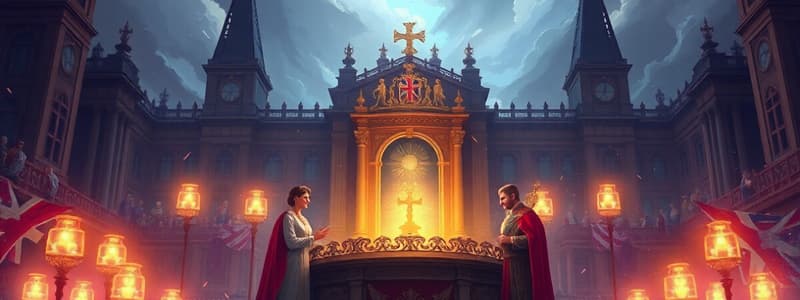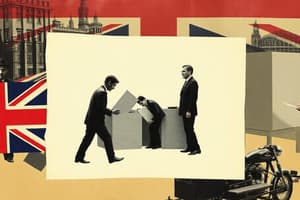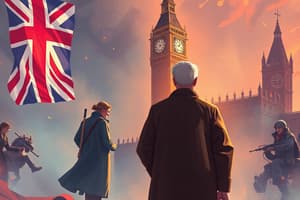Podcast
Questions and Answers
What is a limitation on the exercise of prerogative powers by the executive?
What is a limitation on the exercise of prerogative powers by the executive?
- It cannot be exercised in a manner that contradicts public opinion.
- It must always follow international treaties.
- It must be approved by the judiciary.
- It cannot derogate from the fulfillment of a statutory duty. (correct)
Which power does the government hold concerning war and armed forces?
Which power does the government hold concerning war and armed forces?
- The power to construct military bases.
- The power to levy taxes for military funding.
- The power to recruit soldiers.
- The power to declare war. (correct)
In which case was the royal prerogative established as subject to judicial review?
In which case was the royal prerogative established as subject to judicial review?
- Council of Civil Service Unions v Minister for the Civil Service. (correct)
- R (Miller) v Secretary of State for Exiting the European Union.
- R v Secretary of State for Defence.
- Fire Brigades Union v Secretary of State for the Home Department.
What authority does Parliament have concerning the creation of courts?
What authority does Parliament have concerning the creation of courts?
What is a characteristic of the judicial review of prerogative powers?
What is a characteristic of the judicial review of prerogative powers?
What are the three sources of legal authority on which the UK executive branch can act?
What are the three sources of legal authority on which the UK executive branch can act?
Which of the following best describes prerogative powers?
Which of the following best describes prerogative powers?
What is the significance of the Bill of Rights 1689 in relation to royal prerogative?
What is the significance of the Bill of Rights 1689 in relation to royal prerogative?
Which statement correctly reflects the current role of the Monarch in relation to prerogative powers?
Which statement correctly reflects the current role of the Monarch in relation to prerogative powers?
What determines the uncontroversial use of 'third source' powers?
What determines the uncontroversial use of 'third source' powers?
Which power has Parliament gained the right to veto in recent years?
Which power has Parliament gained the right to veto in recent years?
During the Medieval times, what was one primary duty of the King related to power?
During the Medieval times, what was one primary duty of the King related to power?
What does the Constitutional Reform and Governance Act 2010 signify in the context of executive powers?
What does the Constitutional Reform and Governance Act 2010 signify in the context of executive powers?
Flashcards
Executive Branch Powers
Executive Branch Powers
Legal powers of the UK executive branch, sourced from statutes, prerogative, and 'third source' powers.
Prerogative Powers
Prerogative Powers
Special powers of the executive branch, recognized as part of common law. Often related to the overall public interest.
'Third Source' Powers
'Third Source' Powers
Powers not explicitly statutory or prerogative but exercised if there is no law to prevent them from doing so.
Royal Prerogative
Royal Prerogative
Signup and view all the flashcards
Statutory Powers
Statutory Powers
Signup and view all the flashcards
Constitutional Monarchy
Constitutional Monarchy
Signup and view all the flashcards
Prerogative Power Limits
Prerogative Power Limits
Signup and view all the flashcards
Prerogative Power History
Prerogative Power History
Signup and view all the flashcards
Judicial Review of Prerogative
Judicial Review of Prerogative
Signup and view all the flashcards
Prerogative Power & Statutes
Prerogative Power & Statutes
Signup and view all the flashcards
GCHQ case
GCHQ case
Signup and view all the flashcards
Crown Proceedings Act 1947
Crown Proceedings Act 1947
Signup and view all the flashcards
Study Notes
UK Executive Powers
- The UK executive branch derives power from three sources:
- Statutory powers
- Prerogative powers
- "Third source" powers (not statutory or prerogative, but actions allowed as no law prohibits them)
- Uncontroversial "third source" activities are those an individual could also perform; contentious ones are outside an individual's legal right.
Prerogative Powers
- Historically, the monarch held all power, with prerogative powers being the residue.
- Medieval times saw the monarch holding powers to protect the realm and the public good, but also being subject to law. King's courts handled land disputes, felonies, and other matters, while the Council managed other issues.
- 17th-century conflicts led to the execution of a king, the expulsion of another, and ultimate resolution through courts and Parliament. The Bill of Rights (1689) marked the beginning of responsible government and a constitutional monarchy.
- Today, these powers are exercised by or on behalf of the government, without prior need of Parliamentary authority, with limitations.
- The Constitutional Reform and Governance Act 2010 introduced some limits.
Prerogative Powers Today
- Legislature: Summoning and proroguing Parliament, hereditary peers, and orders in Council to legislate.
- Judiciary: No longer creating courts; Parliament holds that power. Some functions related to criminal justice (like the power to stop prosecutions and pardon).
- Foreign affairs: Powers relating to these.
- Treaties: Parliament now has the right to veto treaty obligations.
- War and Armed Forces: Declaring war.
- Patronage: Appointments and honours.
- Immunities: Crown is not bound by statutes, unless explicitly stated.
- Taxes: The Crown receives tax-exempt benefits from certain sources.
- Crown Proceedings Act 1947: This act governs the procedures for bringing claims against the Crown.
Prerogative Powers and the Courts
- Courts will not recognize newly created prerogative powers.
- Difficult situations arise when deciding where old powers apply to new situations.
- Council of Civil Service Unions v Minister for the Civil Service [1985] AC 374 (GCHQ case): clarified that prerogative powers are subject to judicial review..
- Executive actions cannot take actions that conflict with a statute and derogate from fulfilling a stated duty (like in Fire Brigades Union, 1995).
- Courts define a prerogative power's existence but regulate how it's exercised. Court's determines where limits are if they exist .
Studying That Suits You
Use AI to generate personalized quizzes and flashcards to suit your learning preferences.




